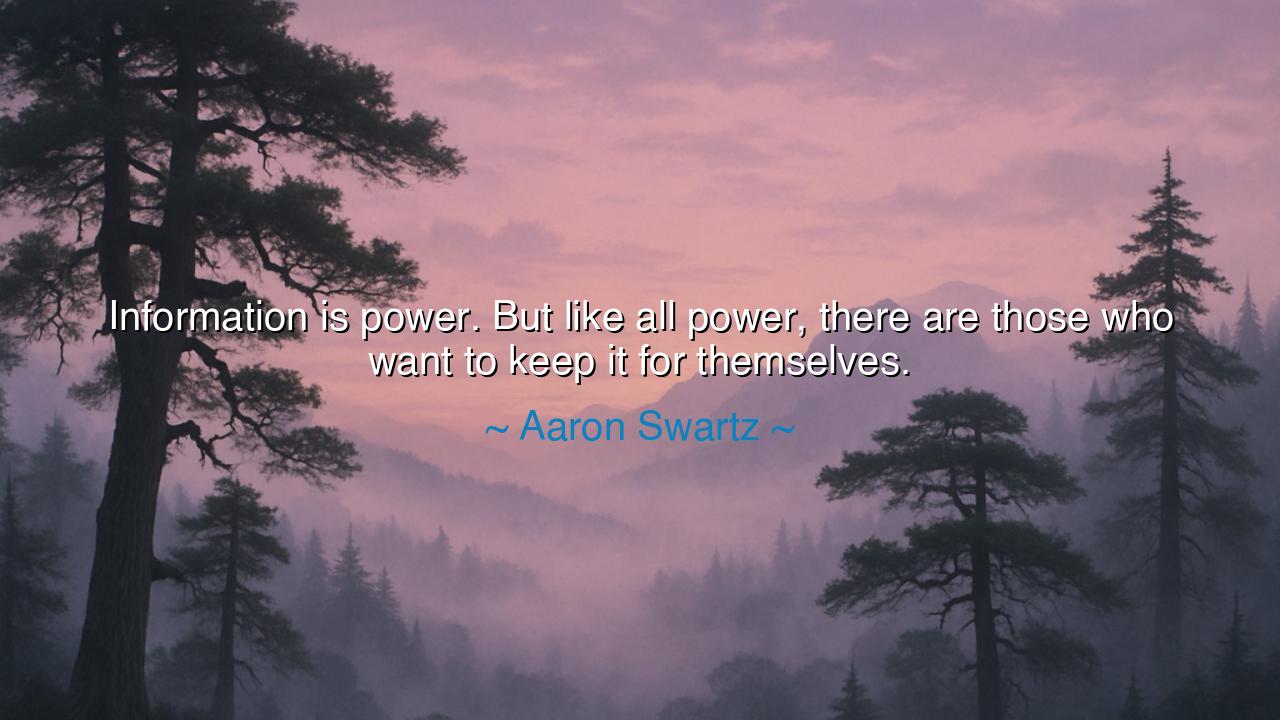
Information is power. But like all power, there are those who
Information is power. But like all power, there are those who want to keep it for themselves.






Hearken, O children of the ages, to the warning of Aaron Swartz, who speaks of a truth as old as human ambition: that information is power. He teaches that knowledge itself carries authority, shaping the destiny of nations, the decisions of rulers, and the lives of ordinary men. Yet, as with all power, there are those who would hoard it, keeping the gates closed to the many and reserving insight for the few, casting shadows over the light that could guide the people.
Swartz reminds us that the battle over knowledge is eternal. The strong may seek to conceal truth, to restrict access, and to shape perception according to their will. Those who guard secrets jealously wield the influence that comes with ignorance in others, for where information is scarce, fear and dependence flourish. Thus, the pursuit of openness, transparency, and the free flow of information becomes not merely a task of intellect, but a moral imperative for justice and liberty.
Consider the example of Galileo Galilei, whose discoveries of the heavens threatened the dominion of those who would control knowledge. His telescopic revelations—showing moons around Jupiter, and a sun-centered cosmos—were met with resistance, censorship, and condemnation. The authorities of his day sought to keep the light of knowledge from the many, for power lies not only in might but in controlling what men know and what they may imagine. Galileo’s courage illuminates Swartz’s warning: truth, once seen, is a power no one can fully suppress.
Yet the lesson extends beyond the grand figures of history. In every village, city, and community, the struggle over information persists. The teacher, the journalist, the scholar, and the archivist all bear the sacred duty to ensure that knowledge flows freely, so that wisdom may be cultivated, injustice revealed, and human potential fulfilled. To monopolize knowledge is to limit the power of the many; to share it is to ignite possibility, courage, and understanding across generations.
O children of the future, carry this teaching in your hearts: guard against the hoarding of truth, seek out the light of information, and use knowledge to serve justice, transparency, and the common good. Remember that the power of insight is not to be confined to the few, for only when knowledge is shared does it fulfill its sacred purpose. In this, the wisdom of Swartz endures: power is a responsibility, and truth is a force to liberate, not to chain.
If you desire, I can also craft a visual, ancient scroll-style presentation of this passage to capture the heroic, timeless, and deeply moral essence of Swartz’s teaching on information, power, and the duty to share knowledge.






HVHA VU
Swartz’s statement about information being power really gets me thinking about how we use it. It’s often said that knowledge is power, but the reality is that it’s not always available to everyone equally. Who decides what information gets shared and who controls it? How can we ensure that the spread of information becomes a tool for positive change and not just a means for certain groups to maintain control? Should there be more regulation of information distribution?
QVVo Quoc Viet
Aaron Swartz’s quote about the power of information is thought-provoking, especially when considering how some powerful organizations control the flow of knowledge. It makes me wonder if it’s even possible to create an entirely open and free system of information sharing without facing resistance from those who benefit from its restriction. How do we build a society where information is accessible to everyone, especially when there are so many interests working to keep it locked away?
NMPham Thi Ngoc My
The idea that some people want to hoard information for themselves resonates with the current state of the internet, where gatekeepers like big tech companies control what we see and know. How do we push back against this centralization of information? Is it even possible for the average person to access and share knowledge freely without being restricted? Maybe the solution is decentralization, but how do we implement that in a way that’s fair for everyone?
MHnguyen manh hai
Swartz’s perspective on information as power is incredibly relevant in today’s world, especially with the way data is used and sometimes manipulated by large corporations. How can we ensure that information remains a tool for empowerment, rather than control? It’s scary to think how information is often withheld from the public. Is there a way to combat this without infringing on privacy or security? How do we find the balance between transparency and protection?
APDuy Anh Pham
This quote strikes a chord because it highlights an issue we see across various industries today—control over information. It’s true that those in power often restrict access to knowledge for their own benefit. But is there a way for society to break this cycle and make information more accessible to all? How do we ensure that the flow of information isn’t dictated by a select few with agendas that benefit them?